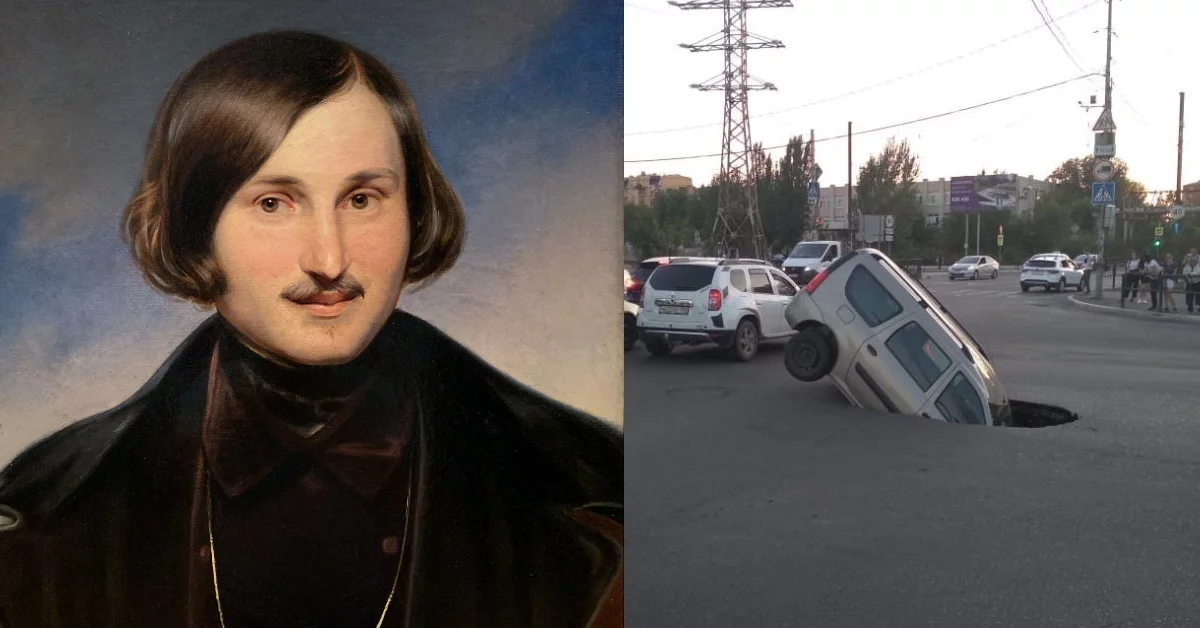According to popular belief, it was the author of “Dead Souls” who introduced the popular thesis about the causes of all Russian misfortunes. We checked if this is true.
You can read about the fact that Nikolai Vasilyevich is the author of the aphorism on the websites of such media as "Rossiyskaya Gazeta", Radio Liberty, "News", RIA Novosti And "Gazeta.ru". The famous Russian journalist Yuri Geiko made the phrase an epigraph to his book "Fools, roads and other features of national driving", while indicating the year the quote appeared - 1840. With a reference to Gogol, the statement also appears in the book of economist and politician Mikhail Delyagin “Fools, roads and other troubles of Russia”. Doctor of Historical Sciences Vladimir Solovyov included the phrase in his encyclopedia "History of the Fatherland". But on the website of the Council under the President of the Russian Federation for the Development of Civil Society and Human Rights approvedthat the quote belongs to Nikolai Karamzin. Sometimes her tie up and with Mikhail Saltykov-Shchedrin.
Despite the fairly frequent attribution of this catchphrase to Gogol, it will not be possible to find something similar in his work, diaries or letters - the Russian classic did not write such a thing. The theme of unimportant roads is touched upon in one way or another in a number of Gogol’s works. For example, in the description of one of Chichikov’s trips in “Dead Souls” said, that “the roads spread out in all directions, like caught crayfish when they are poured out of a bag.” In another episode of Gogol's immortal poem notes, that “a person is generous with the word “fool” and is ready to serve his neighbor with it twenty times a day” (by coincidence, the author himself used this word 24 times in the poem). However, Gogol does not refer to any of these “troubles” as such, either individually or together.
It is useless to look for this quote from other classics - from Karamzin to Saltykov-Shchedrin. Yes, Pushkin in Eugene Onegin complains: “Now our roads are bad, // Forgotten bridges are rotting,” and Nekrasov in one of his poems complains: “We will not reduce the number of fools in Russia, // But we will make the smart ones sad” (reference to Fonvizin’s unfinished poem). But these quotes don’t even look like the beginnings of a future catchphrase.
Structurally similar can be considered the famous “There are two misfortunes in Russia: // Below is the power of darkness, // And above is the darkness of power,” attributed Gilyarovsky. Two troubles rhyme and with slogan “Let’s hit the road and sloppiness with a motor rally” from the novel “The Golden Calf” by Ilf and Petrov. However, for the first time fools meet roads in Russian literature only at the end of the 20th century. Around 1987, satirist Mikhail Zadornov wrote a monologue entitled “Land of Heroes”, which was successfully read from the stage not only by himself, but also by Evgeny Petrosyan (1989 recording). Entered into monologue replica "N. V. Gogol wrote: “There are two troubles in Russia: roads and fools.” This is the enviable consistency we maintain to this day. Have you noticed that every watchman guarding our pool feels like a border guard?” Also in 1989, the monologue was published in printed edition, and at the same time “Gogol’s phrase” was quoted for the first time outside the stage - on Second Congress of People's Deputies of the USSR, and also in the digest "Satellite". The quote went viral and was soon repeated by a politician Nikolay Ryzhkov, journalist Andrey Karaulov and writers Vyacheslav Barkovsky and Andrei Izmailov in their filmed trilogy "Russian transit". Moreover, they all used Zadornov’s order - first they mentioned “roads”, and then “fools”. Over time, these words in the quote have changed in some places.
So, it turns out that the catchphrase about two Russian troubles was invented by Mikhail Zadornov. But why then did the already quite popular author of the colloquial genre attribute it to Gogol? How believes quotation researcher Konstantin Dushenko, “the reference to the classic was supposed to serve as a safe conduct for the censored Soviet satirist and give his thoughts greater authority. This goal was brilliantly achieved: the version of Gogol’s authorship became the main one.”
Fake
Read on topic:
If you find a spelling or grammatical error, please let us know by highlighting the error text and clicking Ctrl+Enter.







